Given the extent of the structural shifts in politics in post-2003 Iraq, the level of destruction in the liberated areas and the depth of distrust among communities, the challenge of post-ISIS recovery could not be greater. To create an inclusive political order in Nineveh and provide a successful model for other parts of Iraq, policy- and decision-makers must engage in constructive debate, share visions and develop strategies tailor-made for the province.
To facilitate such debate among local, national and international stakeholders, the Middle East Research Institute (MERI) and the EastWest Institute (EWI), sponsored by the Konrad-Adenauer Stiftung (KAS) Syria/Iraq Office, hosted a dialogue and brainstorming workshop in Loosdrecht, Netherlands (May 31-June 1, 2017) for representatives of Nineveh’s ethnic and religious communities, members of the Nineveh Provincial Council, the Iraqi Federal Government, the Kurdistan Regional Government and a selection of international donor countries and international non-governmental organisations.
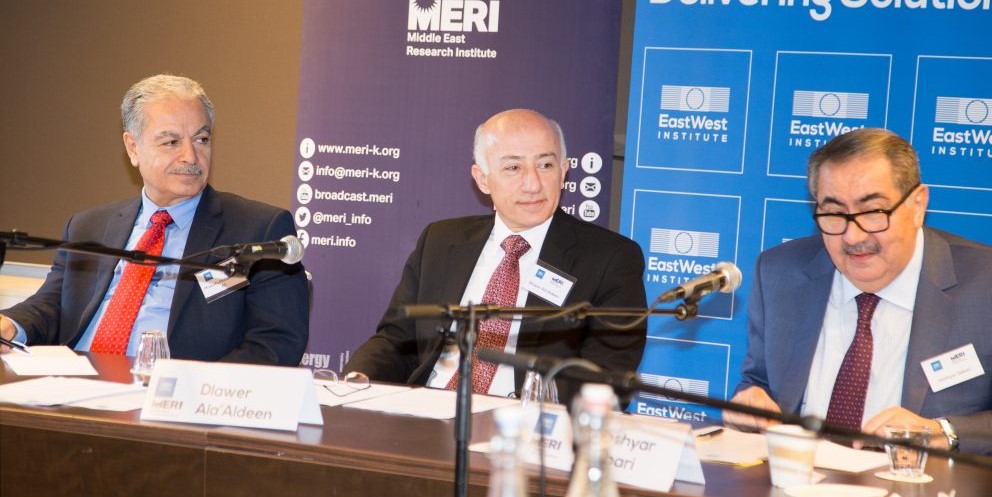
The aim of the workshop was to:
- provide a platform for strategic, thought-provoking and action-focused dialogue on the process of post-ISIS reconstruction in Nineveh over the short, intermediate and long-term.
- support the development of coherent policy responses to the most pressing issues facing Nineveh whilst taking into account the political, sectarian, and ethnic diversity of the province.
 In addition to thorough discussions on priority issues such as stabilisation, reconstruction, reconciliation and the return of IDPs, the ultimate focus was on the political dimension of governance. This includes the political and governance system (centralism, decentralism, federalism, one governorate or multiple governorates), the future of the disputed territories, power and revenue sharing. Lessons learned from the political reconstruction of post-2003 Iraq were important to guide discussions, however, the debate focused on how Nineveh province could provide a good model to later expand into an overarching project on post-ISIS governance in the rest of Iraq.
In addition to thorough discussions on priority issues such as stabilisation, reconstruction, reconciliation and the return of IDPs, the ultimate focus was on the political dimension of governance. This includes the political and governance system (centralism, decentralism, federalism, one governorate or multiple governorates), the future of the disputed territories, power and revenue sharing. Lessons learned from the political reconstruction of post-2003 Iraq were important to guide discussions, however, the debate focused on how Nineveh province could provide a good model to later expand into an overarching project on post-ISIS governance in the rest of Iraq.
The workshop’s sessions and their guiding topics and questions included the following (a detailed report will be published in due course):
Session I: The Big Picture: Lessons Learned Since 2003
- The state-building process in Iraq since 2003
- The evolution of power dynamics at the local, regional and international levels
- What is the current political, military and security situation?
- What are the prospects for the coming 12 months?
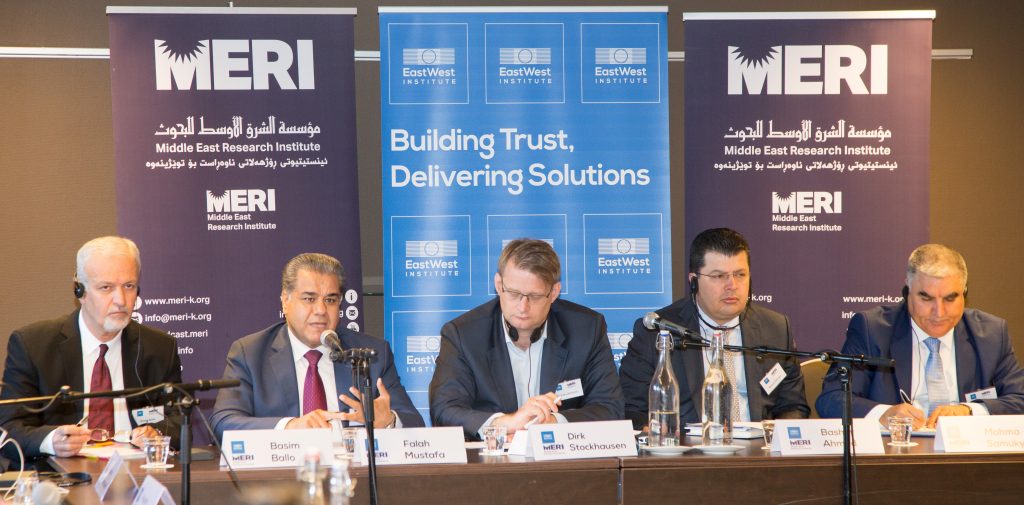
Session II: Governing Nineveh: Post-ISIS Stabilisation and the return of Internally Displaced People
- What are the security arrangements to help stabilise the liberated areas and what are the challenges?
- What public services have been restored?
- Where are the IDPs currently and what proportion have gone home so far?
Session III: Reconstruction: Plans and Prospects
- Assessment of the areas and the intensity of damage.
- Defining the magnitude of the challenge.
- What plans are in place for funding and executing the reconstruction process?
- National and international contributions and coordination.
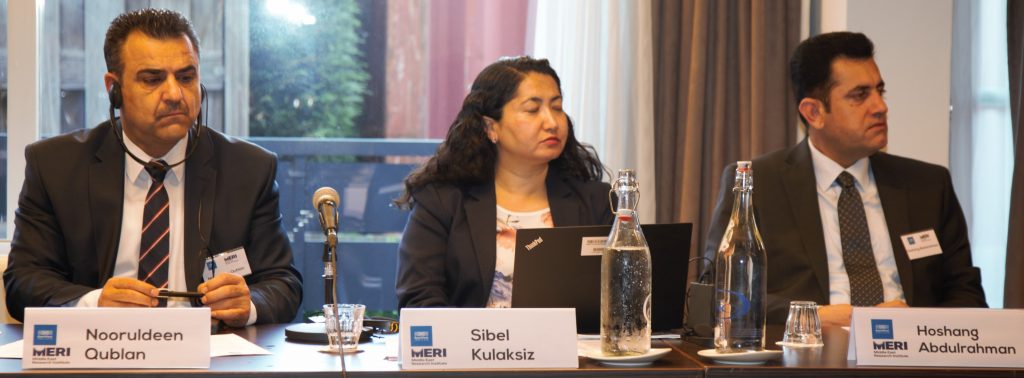
Session IV: Reconciliation: Hard Lessons From Post-2003
- How can trust be rebuilt between communities to bring back a sense of normality?
- How can trust be re-established between people and authorities?
- How can justice be established?
- Comparative analysis of post-2003 and post-ISIS reconstruction. What worked, what didn’t, and why?
Session V: Governing Nineveh: Devolution of Power and Redefining Relations with Baghdad and Erbil
- Which type of governance arrangement would serve Nineveh best: centralism, decentralism, federalism, one governorate or multiple governorates?
- How can the future of disputed territories be solved?
- How can power and revenue sharing be ensured?
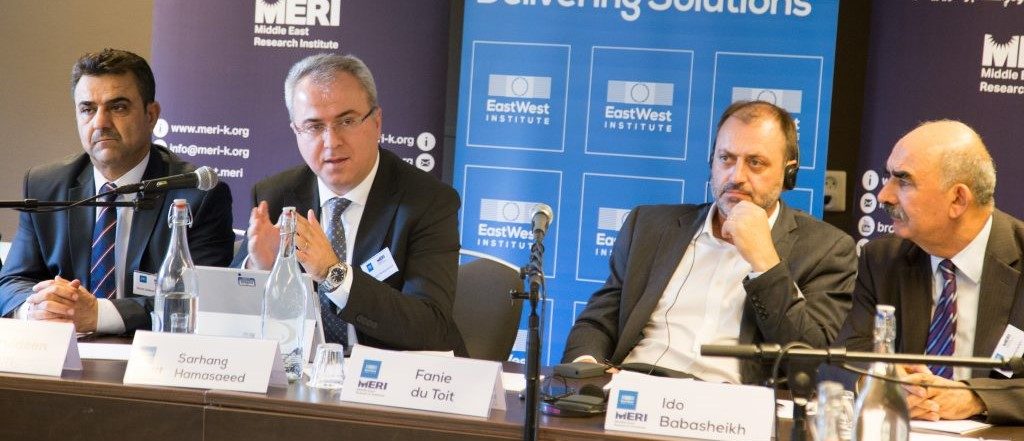
Session VI: Role of the International Community
- What are the international actors’ main concerns and priorities?
- What has been the level of engagement and contribution by the international community in the processes of stabilisation, humanitarian aid, reconstruction (planning, funding) and reconciliation?
- What more can they do to help to achieve long term peace, stability, good governance and de-radicalisation?
The opening remarks were delivered by Birgitta Tazelaar, Director of Middle East & North Africa for the Ministry of Foreign Affairs, Netherlands. This was followed by lively debate with the following panellists and participants:
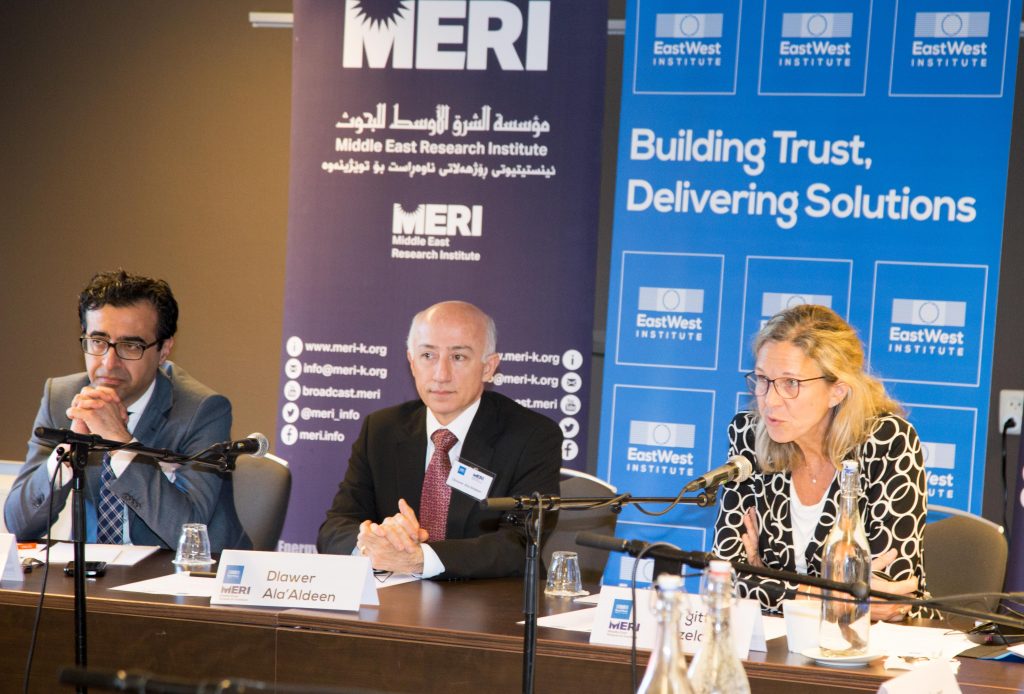
-
- Hoshyar Zebari, Former Minister of Foreign Affairs and Finance; PB Member, Kurdistan Democratic Party
-
- Mustafa Mohammed Ali, President, Reconstruction Fund of the Areas Affected by Terroristic Operations
-
- Falah Mustafa, Head Directorate Foreign Relations, KRG
-
- Hoshang Abdulrahman, Director General, Joint Crisis Coordination Centre (JCC), Ministry of Interior, KRG
-
- Bashar Al-Kiki, Chairman, Nineveh Provincial Council (NPC)
-
- Nooruldeen Qublan, Deputy Chairman, Nineveh Provincial Council (NPC)
-
- Basim Ballo, Mayor, Telkef District
-
- Mahma Khaleel Samuky, Mayor, Sinjar Local Authority
-
- Asen Kahiyah, Head of Reconstruction Committee, Nineveh Provincial Council (NPC)
-
- Sael Alomari, Deputy Governor for Reconstruction, Nineveh Provincial Government
-
- Sibel Kulaksiz, Senior Economist Iraq, World Bank
- Gregory Morrison, Political-Economic Officer, US Consulate General, Amsterdam
-
- Sarhang Hamaseed, Director of Middle East Programs, United States Institute of Peace (USIP)
-
- Fanie du Toit, Consultant for National and Community Reconciliation, UNDP
-
- Ido Babasheikh, Advisor to the Former President of Iraq on Minority Affairs
-
- Sibel Kulaksiz, Senior Economist Iraq, World Bank
-
- Gerard van Driessche, Head of the Middle East/Gulf Section, DEVCO, European Commission
-
- Dirk Stockhausen, Deputy Head of Division; Head of Iraq Team, Federal Foreign Office, Germany
-
- Matthew Houlsby, Head, Political Section, British Embassy in Baghdad
-
- Simone Van den Broek, Policy Officer Iraq, North Africa and Middle East Department
-
- Joëlle Coureau, Head of Foreign Policy
-
- Aytac Yilmaz, Head of Department, Deputy Directorate General for Iraq
-
- Dlawer Ala’Aldeen, President, Middle East Research Institute (MERI)
-
- Kawa Hassan, Director, Middle East & North Africa Program, EastWest Institute (EWI)
-
- Khogir Wirya Mohammed, Researcher, MERI
-
- Fuad Ali Smail, Director of Human Resources & Finance, MERI
-
- Wael Abdul-Shafi, Program Coordinator, Middle East and North Africa Program
- Lana Schmidt-Goertz, Program Assistant, Middle East and North Africa Program
* * * * *
About MERI: The Middle East Research Institute is Iraq’s leading policy-research institute and think tank. It is an independent, entirely grant-funded not-for-profit organisation, based in Erbil, Kurdistan Region. Its mission is to contribute to the process of nation-building, state-building and democratisation via engagement, research, analysis and policy debates.
MERI’s main objectives include promoting and developing human rights, good governance, the rule of law and social and economic prosperity. MERI conduct high impact, high quality research (including purpose-based field work) and has published extensively in areas of: human rights, government reform, international politics, national security, ISIS, refugees, IDPs, minority rights (Christians, Yezidis, Turkmen, Shabaks, Sabi mandeans), Baghdad-Erbil relations, Hashd Al-Shabi, Peshmarga, violence against women, civil society. MERI engages policy- and decision-makers, the civil society and general public via publication, focused group discussions and conferences (MERI Forum).

